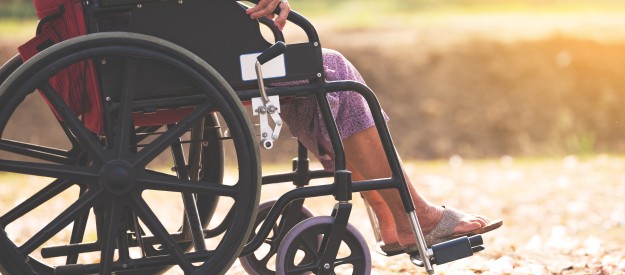"We are losing our attitude of wonder, of contemplation, of listening to creation and thus we no longer manage to interpret within it what Benedict XVI calls 'the rhythm of the love-story between God and man.'"
+ Pope Francis
Of Parkinson's and the planet

There is no test for Parkinson ’s disease. My mother’s neurologist made that clear early on. There is nothing to look for in the blood, no measurement of one’s nervous system, no device or probe to determine if the disease is present or if it is not.
Rather, doctors look for its effects: telltale tremors, changes in the ability to walk, and in other motor skills. And when they find these signs and issue their diagnosis, the doctors tell you that the condition will only worsen, and that there is no cure.
As I watch my mom succumb to the disabilities of this disease, I'm reminded of the telltale signs of how another mother—our planet and its ecosystems—is failing, and how there may be no cure. Our planet’s natural systems are weakening as they are ravaged ever again by the choices of fallen human beings, who too often do not know how to take only what is necessary, and no more.
Of late we Catholic ecologists have been busy following the calls of every pontiff that has reigned in the 21st century. We have entered the public square and demanded the protection of creation’s natural environments, and the human beings that they nurture. We have protested and signed petitions. We have held webinars and given talks. We have raised our voices and prayers to educate and edify anyone around us so that they may better care for our common home.
But has it been enough? Will it be enough?
Sin is a terrible reality, and we human beings are ill equipped to engage it and assuage it without the grace of God. This primacy of grace has been my constant cry within this blog and elsewhere. That is not to say that our protests and petitions and all the rest come with no benefit. It’s not to say that we must give up hope.
Rather it is to say that we must find peace in our true hope, which comes only from our Creator, who alone takes away the sin of the world.
I know that my mom has been saved by Christ—in her baptism and in her closeness with Christ, especially in the Eucharist. When she dies, I will entrust her, body and soul, to Christ’s mercy. But at the moment her body continues to decay even as I pray for healing. Her ability to control movement continues with difficulty, even with the three daily doses of carbidopa, and now the entacapone that extends its effects because in time carbidopa looses its potency; even with the dozen other medications that treat or hide this or that condition but cure nothing.
Likewise, even with all our technical advances in clean energy and better means of production, we humans may very likely be unable to control the destructive advances of our lifestyles, hidden and rooted as they so often are deep within our ignorance, selfishness, desire, and even our fears.
Doctors say that the best weapon against Parkinson’s is keeping the patient moving. To that I add loving them enough to keep them safe and supported as they wither. (Actually, the best medicine is often a sense of humor, so that no matter how troubling the day, the patient still finds some joy.)
Perhaps our role as Catholic ecologists is a similar one.
Maybe the role of the Church is not necessarily to ensure that governments, businesses, and consumers change everything to save all. Maybe it's not in our abilities to reign in carbon emissions, or to sufficiently quell the destruction of rain forests and aquatic ecosystems. Maybe we can't change any of that, or as much as is necessary.
Of course, I hope we can. And we must continue and expand all efforts to do so.
But perhaps our most important job is to bring to the world a love and joy that comes only from Christ.
Take it from someone who cannot cure his mother's Parkinson's disease, but who can be by her side as the years roll on: we are at our best when we embrace our Christian calling to accompany the patient—to suffer with, which is the meaning of the word compassion. This is, after all, what the Church has always done, and done well, much to the surprise of others. Christ did not come to change political orders through direct confrontation. He came to comfort, challenge, and elevate human hearts. Likewise, from the early decades of the Church, it has been Christian sacrificial love—fueled by God’s grace—that has altered the expectations of civilizations by bringing simple face-to-face charity to the suffering of the moment.
I would argue that this is the ultimate role of the Catholic ecologist.
It is only in heeding this Christian call that we will save the world—not politically or socially, or medically, as we might wish, but as God would expect of those who carry the Cross confident in the sure promises of Easter—of the new heavens and the new earth, which He, not we, will bring about, even as we continue here and now to work for some cure.
Supplemental note: Well, here's a bit of grace right here. The day after I posted this comes news of findings for possible new treatments and prevention of Parkinson's. If so, they would be years away. But still, God is good!


















